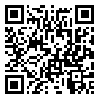دوشنبه 10 آذر 1404
[Archive]
دوره 7، شماره 2 - ( 1-1398 )
جلد 7 شماره 2 صفحات 106-95 |
برگشت به فهرست نسخه ها
Download citation:
BibTeX | RIS | EndNote | Medlars | ProCite | Reference Manager | RefWorks
Send citation to:



BibTeX | RIS | EndNote | Medlars | ProCite | Reference Manager | RefWorks
Send citation to:
Radsepehr H, Shareh H, Dehnabi A. Evaluation of Positive and Negative Affect Induction on the Regional Brain Activity and Personality Traits. PCP 2019; 7 (2) :95-106
URL: http://jpcp.uswr.ac.ir/article-1-558-fa.html
URL: http://jpcp.uswr.ac.ir/article-1-558-fa.html
Evaluation of Positive and Negative Affect Induction on the Regional Brain Activity and Personality Traits. Practice in Clinical Psychology. 1398; 7 (2) :95-106
چکیده: (4582 مشاهده)
Objective: The present study aims to investigate the effect of emotions (negative and positive affects) and gender on the activity of different brain regions and their relationship with personality traits of extraversion, introversion, neuroticism, and stability.
Methods: The study participants were 33 right-handed volunteer undergraduate students (17 males and 16 females). Our stimuli were two 6-minute long happy and sad video clips. We used electroencephalography for brain imaging. Briggs-Nebes handedness questionnaire, Eysenck personality inventory, general health questionnaire, and positive and negative affect schedule questionnaire were used for assessing participants’ reactions. The collected data were analyzed by MANOVA and ANOVA tests.
Results: Different activities due to positive and negative affect inductions were seen only in right temporal (Sig.=0.036, F=3.453), left temporal (Sig.=0.045, F=2.873), right posterior (Sig.=0.032, F=3.157) and left posterior lobes of the participants’ brains (Sig.=0.014; P<0.01, F=2.932). Under positive affect induction, the activity of right temporal lobe in extraverted people was higher than that in introverted ones. No significant difference was found in the right anterior and right posterior activities between stable and neurotic individuals under negative attitude induction (F=0.387, P>0.05). There was no significant difference of activity in the left anterior of stable and neurotic subjects under negative attitude induction (P>0.05). Also, there was no significant difference between male and female students’ brain activity (P>0.05).
Conclusion: Therefore, regional brain activity is different under positive attitude and negative attitude inductions, but gender does not affect it. Also, personality traits are effective in the activity of some brain regions.
Methods: The study participants were 33 right-handed volunteer undergraduate students (17 males and 16 females). Our stimuli were two 6-minute long happy and sad video clips. We used electroencephalography for brain imaging. Briggs-Nebes handedness questionnaire, Eysenck personality inventory, general health questionnaire, and positive and negative affect schedule questionnaire were used for assessing participants’ reactions. The collected data were analyzed by MANOVA and ANOVA tests.
Results: Different activities due to positive and negative affect inductions were seen only in right temporal (Sig.=0.036, F=3.453), left temporal (Sig.=0.045, F=2.873), right posterior (Sig.=0.032, F=3.157) and left posterior lobes of the participants’ brains (Sig.=0.014; P<0.01, F=2.932). Under positive affect induction, the activity of right temporal lobe in extraverted people was higher than that in introverted ones. No significant difference was found in the right anterior and right posterior activities between stable and neurotic individuals under negative attitude induction (F=0.387, P>0.05). There was no significant difference of activity in the left anterior of stable and neurotic subjects under negative attitude induction (P>0.05). Also, there was no significant difference between male and female students’ brain activity (P>0.05).
Conclusion: Therefore, regional brain activity is different under positive attitude and negative attitude inductions, but gender does not affect it. Also, personality traits are effective in the activity of some brain regions.
نوع مطالعه: پژوهشي |
موضوع مقاله:
رويكرد شناختي رفتاري
دریافت: 1397/7/20 | پذیرش: 1397/11/8 | انتشار: 1398/1/12
دریافت: 1397/7/20 | پذیرش: 1397/11/8 | انتشار: 1398/1/12
| بازنشر اطلاعات | |
 |
این مقاله تحت شرایط Creative Commons Attribution-NonCommercial 4.0 International License قابل بازنشر است. |



